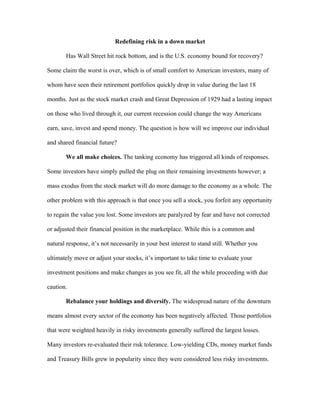
Redefining Risk
- 1. Redefining risk in a down market Has Wall Street hit rock bottom, and is the U.S. economy bound for recovery? Some claim the worst is over, which is of small comfort to American investors, many of whom have seen their retirement portfolios quickly drop in value during the last 18 months. Just as the stock market crash and Great Depression of 1929 had a lasting impact on those who lived through it, our current recession could change the way Americans earn, save, invest and spend money. The question is how will we improve our individual and shared financial future? We all make choices. The tanking economy has triggered all kinds of responses. Some investors have simply pulled the plug on their remaining investments however; a mass exodus from the stock market will do more damage to the economy as a whole. The other problem with this approach is that once you sell a stock, you forfeit any opportunity to regain the value you lost. Some investors are paralyzed by fear and have not corrected or adjusted their financial position in the marketplace. While this is a common and natural response, it’s not necessarily in your best interest to stand still. Whether you ultimately move or adjust your stocks, it’s important to take time to evaluate your investment positions and make changes as you see fit, all the while proceeding with due caution. Rebalance your holdings and diversify. The widespread nature of the downturn means almost every sector of the economy has been negatively affected. Those portfolios that were weighted heavily in risky investments generally suffered the largest losses. Many investors re-evaluated their risk tolerance. Low-yielding CDs, money market funds and Treasury Bills grew in popularity since they were considered less risky investments.
- 2. Unfortunately, these options don’t provide much return. In fact, your assets may remain rather stagnant in these investment vehicles, but some argue that could be better than watching your savings drop in value. Buy low if you can bear the risk. This suggestion may seem counterintuitive, but if you are in a position to accept risk, right now is a great time to invest. The market is full of bargains and there will be people who can profit from the market’s downfall. As the old adage goes, buy low and sell high. But as recent history shows, investing involves risks — more than many of us bargained for — and there are no guarantees. Recoup some of your losses through tax breaks. With the failure of mortgage companies, banks, development firms, car manufacturers and other businesses, some investors have experienced losses that simply can’t be replaced. If you find yourself at ground zero (or below), keep in mind that you may be able to offset your losses in the form of tax breaks. Talk to your tax advisor to determine if you can deduct a portion of your losses from your taxable income. Consult with a financial advisor. Now more than ever, investors can benefit from the insights of an experienced financial advisor who can help you sort through your options. As survivors of the recession, we can potentially work even harder, adjust our expectations and appreciate what we have. Much of the success or failure of the stock market relies on something intangible — buyer confidence. If we can find our way back to confident investing, we could be on our way to a stronger economy. Daniel J. Lensing, CPRC® Financial Advisor Business Financial Advisor Ameriprise Finanical Services, inc.
- 3. 14755 No. Outer 40, Suite 500 Chesterfield, MO 63017 Tel: 636-534-2097 This column is for informational purposes only. The information may not be suitable for every situation and should not be relied on without the advice of your tax, legal and/or financial advisors. Neither Ameriprise Financial nor its financial advisors provide tax or legal advice. Consult with qualified tax and legal advisors about your tax and legal situation. This column was prepared by Ameriprise Financial. Diversification helps you spread risk throughout your portfolio, so that investments that do poorly may be balanced by others that do relatively better. Diversification is not a guarantee of overall portfolio profit or protection against loss. Financial planning services and investments offered through Ameriprise Financial Services, Inc., Member FINRA & SIPC. © 2009 Ameriprise Financial, Inc. All rights reserved. File # 84846 6/09